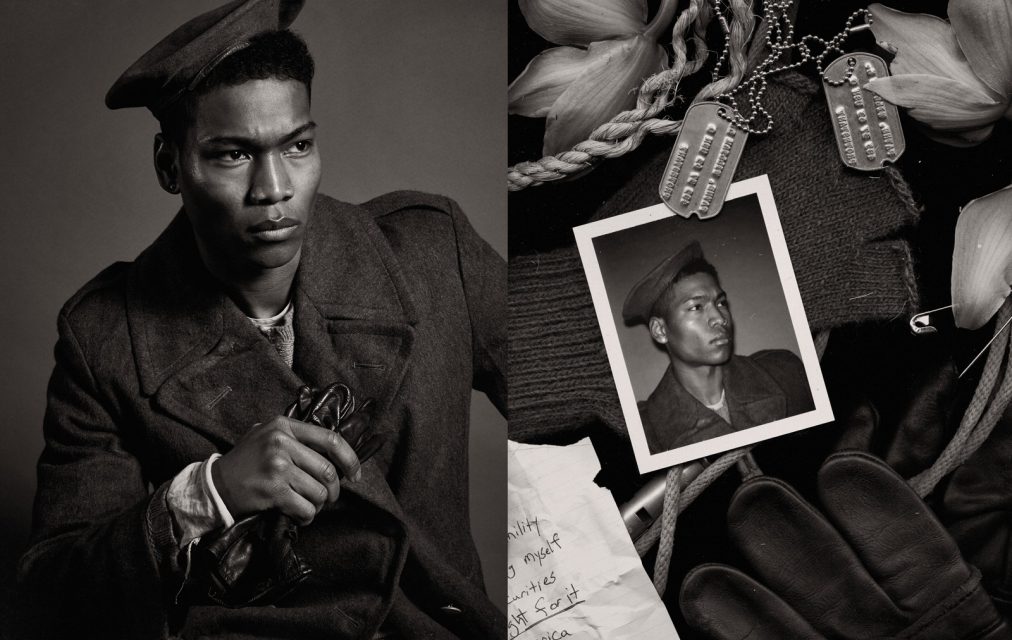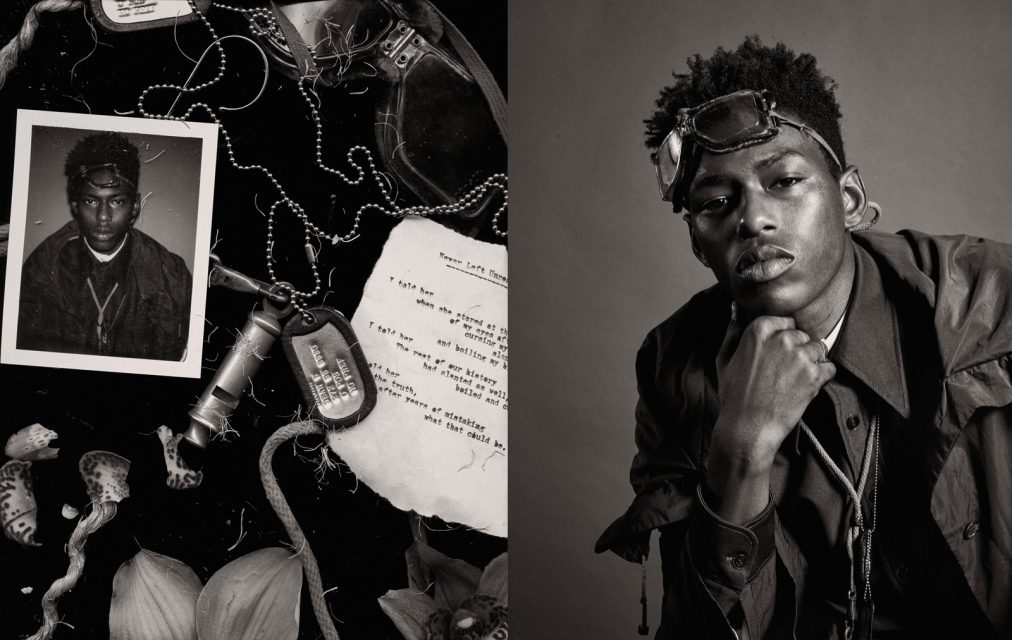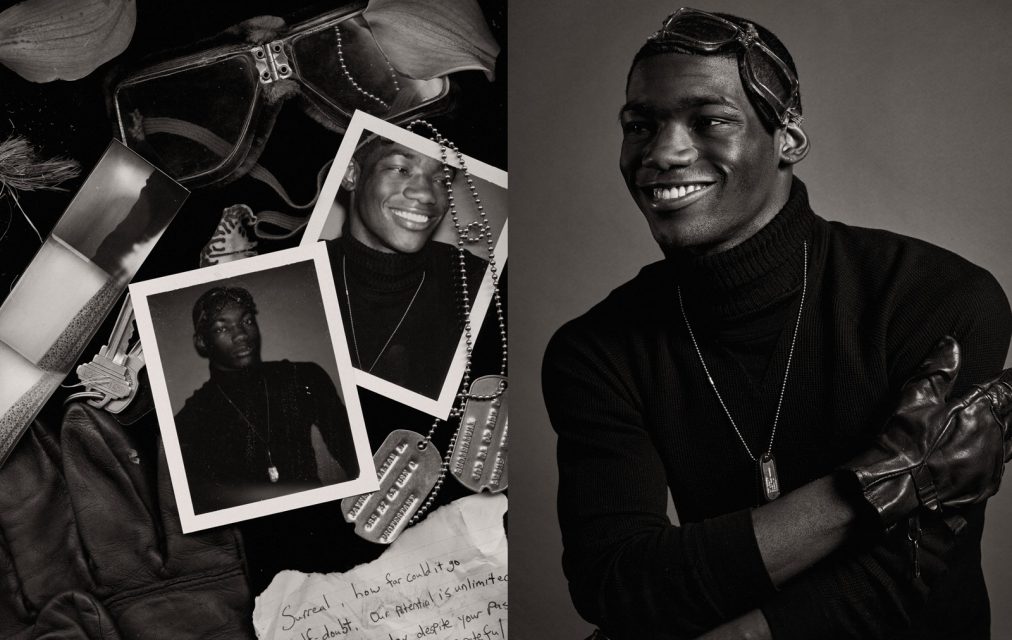These are turbulent times. While the current regime’s populist ideologies evoke darker periods of America’s past, the fashion industry appears to be making slow, positive strides into the future… or at least into the present. Almost gone are the days when a black model is cast only when the theme allows — we all know the tropes: the Grace Jones or Josephine Baker inspiration; the noble savage Out of Africa story; the buff, fetishized male adonis; the ghetto fabulousness. Models of color are slowly becoming less of a plot point, more par for the course. And nowhere has more potential for that to be realized than in men’s fashion, which has been revolutionized and reinvigorated by streetwear, a movement with deep black American cultural influences. The world of male modeling is expanding its definition of black male beauty from the perfectly sculpted, hyper masculine appeal of Tyson Beckford (and very few others) to something that is a little more cross-sectional. Though more black men are being represented positively in fashion, does it translate into how they are perceived and regarded in general US society? Here we talk to six young black men, all upcoming male models, about their experiences both in the fashion industry and in America.
Styling by Derek Ezra
Production by Natasha Garoosi
Hair by Mideyah Parker
Makeup by Juan Jaar using MAC
Floral design by Mihalis Petrou
Xavier was assisted by Mark Chapman and Fiorella Barbieri. Derek was assisted by Melissa Morales
Hats, dog tags, and goggles from Melet Mercantile. All other clothing is vintage.

On becoming a model:
I come from 10 kids, so I wanted to do something unique from my other siblings. I love being artistic and creative so I gravitated towards being an entertainer.
Since I was 6 I would dance all the time. I have a scar because I was doing a spin while dancing to a Michael Jackson song and I fell on my forehead.
There was some resistance from my family at first because they wanted me to go to school, get a proper education and do something more practical. I kept on coming to NYC and it took me about 5 years to sign with an agency. One day I got a casting call for a Lady Gaga campaign and if I got it it would be the first big job for me. I ended up stealing my mom’s car (I got the biggest slap when I got home) but luckily I got the job and from there I got signed.
His breakthrough:
When I booked my first job. My mom told me at first not to do it, but it ignited a light in me to push further and when I came back and I gave her my first check, she smiled and said, “god bless you, keep doing what you are doing”. That was the most grateful thing I’ve ever experienced. My mother, she’s the most angelic, pure person. She left home when I was 6 to work and sent us money, and because of her I do everything.
On being a black man in fashion and in America:
I didn’t know what color was when I was younger but I think it’s quite the same to be a black man in America and in the fashion industry.
Our industry is still working towards accepting cultural differences. In fashion they’re starting to realize that money doesn’t have a color. Everyone from all cultures will purchase things.
Legacy:
I want to inspire kids to believe in something. It’s a waste of life if you don’t have anything to believe in. Believe in something that makes your skin crawl [with excitement] at night.

How he got started:
I was performing on the subway and my agent stopped me on the platform.
What keeps him going:
Looking at the people I’m around, when I see them doing good, it motivates me to get better. You always need to grow and become better.
On being a black man in fashion and in America:
I feel that we are more accepted now in the industry. The models before us opened doors, helped show the importance of diversity and the value we have in society like any other individuals. I feel like when a designer captures diversity things just become better.
Words of wisdom:
Of color, skinny, fat, whatever… when you put your mind to it, you can be anything you want to be. Just put 100% into it.

How he got his start:
I was living in Georgia at the time, and my niece had sent photos to my first agency and they flew me on a plane the next day to New York. I got to NY and took a break in Miami for a year. When I got back, things started to pick up, I landed my first big show at Givenchy, and after that I got the campaign. Then Adidas, then Givenchy again and again… at the end of last season I did a Givenchy exclusive and still got cast by Balmain. I was allowed to do both shows despite the politics of it all.
On staying motivated:
I try to keep positive people and people that are in the industry around me because they know what’s going on. My friends are inspirational and that’s where my push comes from. Where I come from in LA, the ghetto, it’s highly unlikely for a kid now to live past 18 years old. I’m now past 25, and I was supposed to be a statistic, so it’s definitely a blessing and highly appreciated to be around such supportive people who give me the opportunities for all these big jobs and allow me to grow in a space where it’s harder for a male black model with tattoos to be in this industry.
How he represents the change he wishes to see in the industry:
With everything I do, I try to project nothing but positivity. There have been a lot of negatives in my life, but if you dwell on a negative, you’ll never grow from it. Where I come from almost everything you do — even if it’s positive — can be seen as a negative. When I started modeling, I was getting so much backlash from people who knew me, questioning my sexuality, questioning why I have these tattoos, questioning everything. I realized if you’re not a strong, driven individual who can keep a positive mindset, you won’t be able to move forward. So for me, I had to really build a strong ground, recognize that this is me, this is who I am, I am powerful, I know my worth and I can make a change and be a living example to others who don’t believe.
His biggest risk:
When I booked Givenchy, I had to go to Paris. I was in a place in my life where I felt like I was making a lot of sacrifices as far as family goes. I’m very considerate of my family and their wellbeing. People don’t understand that the modeling industry is separate from your family. I was living in NYC while my family was living in LA and spread out in other places. It was my mother’s 60th birthday, and my little brother was murdered a month and a half before that. I was just not happy and I was going back and forth with my agency. I told them I understand this is supposed to take me to the next level, but at the same time, I don’t want to sacrifice my happiness over a campaign. I ended up doing the campaign, which was amazing, but everything I do now is a sacrifice so that everyone that is looking up to me can be taken care of, whether it’s financially or just me being there for them. Being a model forever isn’t guaranteed, but during the time I’m here I want to work my best towards leaving an impact on others.
On being a black man in fashion and in America:
As a black man growing up in south central LA vs me as an adult in NYC on my own, it’s very stressful, especially when you love where you come from, and you respect from where you come from, but there’s a lot of judgment that is cast on you based on your image.
The story behind one of his tattoos:
My stomach tattoo is a picture of my father and underneath it says, ‘rolling stone wears no masks’. My father told me that when I was leaving LA. He is someone I value very highly so I was on the plane thinking about it the whole time. He was basically telling me don’t be afraid to be who you are, don’t hide those things, don’t be afraid to pour your emotions out. He’s never afraid to express how he feels with no sugar on top and I really admire him being that presence in my life.

How he keeps persevering:
I stay motivated by remembering my past, realizing how far I’ve come. My first job was at McDonalds, then I did security for $8 an hour at Saint Laurent, then I did a doorman job which paid $18 an hour. I would juggle different jobs and work night shifts. I worked so hard to earn just a little amount of money every two weeks. Someone told me you’re working hard and not working smart.
I used to open doors for other people then I realized I could open doors for myself. I took that literally. People would come in and spend more than I made in a week and that motivated me because it taught me there was more to life than what I thought I knew.
What makes him feel grateful:
I was able to buy my mom a home. Make her happy and proud. Do things for her. No money in this world could pay her back for what she did.
On being a black man in fashion and in America:
I feel like it all depends on your perspective on things. Regardless of my color from the outside, I’m a human being, we should all be looked at and respected the same.
Change is happening everyday. America is equality, all forms of life together. Every culture has something to offer. We’re all united. We’re here to make a statement that we need each other to survive.
His advice:
Read more books, more self development books. Youtube or Google how to become a better person. Spiritual healing teaches you the importance of what’s within and not what you see outside.

His passions:
Playing NBA 2k (lol). Learning to act. Reading government archives, i.e. the Nixon tapes and memos. Writing.
On being a black man in fashion and in America:
I feel the same marginalization — I feel second class and like an after thought. It’s unfortunate because I feel like our country, and especially the fashion industry, really depends on black culture but doesn’t want to give us the same privileges as white models.
His advice for future models:
Stay humble, don’t be a social climber or a diva.
Why he thinks you should know your history:
It’s hard to move forward without context and understanding. That’s where I feel like we’re stuck right now. We’ve watered down and censored our history when we should be using it to help solve problems.

How he got his start:
I started with local shows and shoots in Charlotte, North Carolina, while I was still serving in the Army. I was discovered by runway coach Alva Page at a show. He recommended that I meet with and shoot with photographers Joseph Bleu and Tarrice Love. After those shoots, I was introduced to my booker, George Brown at RED NYC. RED has been my home ever since.
His breakthrough:
At first, my career took off to a really strong start. My first show was Givenchy Paris exclusive and I booked a lot of shows afterwards. I had my first fragrance campaign 8 months after signing and my first campaign in Times Square after about a year. During my debut season, I worked with a lot of amazing people and clients. The New York Times did a digital article on me and my story, and my unit in the Army was less than pleased, but there are plenty of military models in the industry so they couldn’t say much.
Why history matters:
The importance of understanding our history cannot be over emphasized. Our history is much more than the white-washed memories that our school-books and public school teachers will push. Our history – not just as Blacks, but as Americans – is FULL of treasures. Our ancestors left the instructions for everything to us – don’t let the system that would destroy your mind win. I am currently reading a book called A People’s History of The United States. I HIGHLY recommend it as a starting point for anyone that wants to understand the importance of our history.
The moments for which he’s most grateful:
Wow — there are so many. Honestly, the entire experience has been an exercise in gratitude, really. There is the day I signed my contract, the early days when I went to sleep hungry on subway trains, and woke up to “booking confirmed” emails, the tears of gratitude when my agent renegotiated rates and what I thought I would have to live on for a few months was doubled, or even tripled, and I could send something back to my family to show my support. But really, I think what I’m most grateful for is the people. I’ve been blessed to work with mentors and coaches and artists and philanthropists guised as photographers that have really changed the world through their craft. I’m currently partnering my personal vlogging project BecomeMoved.co with the BASTARD fanzine initiative started by Idris + Tony.
On being a black man in fashion and in America:
Wow – that’s another big one. I know there are challenges that come in the form of skin pigmentation levels in the industry – and in the longstanding racial climate of our country – but I love what the greats in the industry (and our country) have done and the examples they continually set. Fashion icon Ms. Beth-Ann Hardison took the fear of black models in the industry and completely flipped it on it’s head; Instead of trying to conform to white standards, she pushed the agenda of embracing fearlessly and with pride all things that are different and beautiful. The richest woman in the world, Miss Oprah Winfrey, essentially did the same thing by remaining true to herself and what she wanted to produce, despite the color of her skin and the efforts of companies to adjust her content. In the industry today, quite a few of the top models of color have figured out how to authentically reverse engineer the stance that embracing your uniqueness has carved out, and are standing in it fearlessly. And it’s working beautifully. Being black in America, or black in the industry, means you have to carry a black legacy with you. Those of us that do so with honor understand that it’s not the legacy so much, but rather how and where we carry it that matters most.


